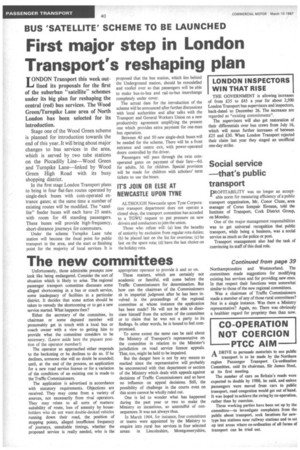The new committees
Page 42

If you've noticed an error in this article please click here to report it so we can fix it.
Unfortunately, those admirable precepts now look like being endangered. Consider the sort of situation which is likely to arise. The regional passenger transport committee discusses some alleged shortcoming in a bus or coach service, some inadequacy of facilities in a particular district. It decides that some action should be taken to remedy the shortcoming or to get a new service started. What happens then?
Either the secretary of the committee, its chairman or some deputed member will presumably get in touch with a local bus or coach owner with a view to getting him to provide what the committee considers to be necessary. (Leave aside here the piquant position of the operator member!) The operator so approached either responds to the beckoning or he declines to do so. If he declines, someone else will no doubt be sounded; until, at the end of the process, an application for a new road service licence or for a variation of the conditions of an existing one is made to the Traffic Commissioners.
The application is advertised in accordance with statutory requirements. Objections are received. They may come from a variety of sources, not necessarily from rival operators. They may relate to all sorts of matters: suitability of route, loss of amenity by householders who do not want double-decked vehicles running down their road, the position of stopping points, alleged insufficient frequency of journeys, unsuitable timings, whether the proposed service is really needed, who is the appropriate operator to provide it and so on.
These matters, which are certainly not academic or fanciful, will come before the Traffic Commissioners for determination. But how can the chairman of the Commissioners sit in impartial judgment after he has been involved in the proceedings of the regional committee at whose instance the application has been made? He will not be able to dissociate himself from the actions of the committee or to claim that he was not a party to its findings. In other words, he is bound to feel compromised.
To some extent the same can be said about the Ministry of Transport's representative on the committee in relation to the Minister's jurisdiction on road service licence appeals. That, too, might be held to be impaired.
But the danger here is not by any means so marked since the representative will probably be unconnected with that department or section of the Ministry which deals with appeals against decisions of Traffic Commissioners and so have no influence on appeal decisions. Still, the possibility of challenge in the courts even on this score cannot be wholly ruled out.
One is led to wonder what has happened during the past year or two to make the Ministry so incautious, so unmindful of consequences. It was not always thus.
In March 1964, for instance, four committees or teams were appointed by the Ministry to enquire into rural bus services in four selected areas: in Lincolnshire, Montgomeryshire,




































































































































